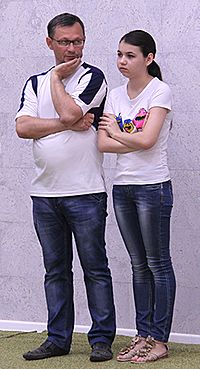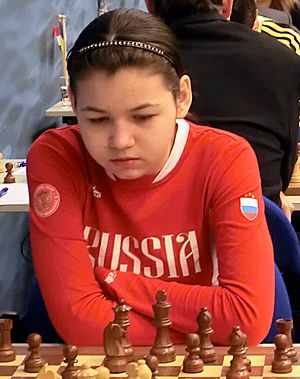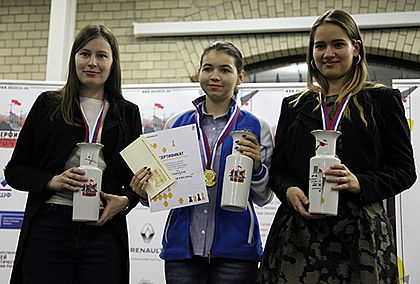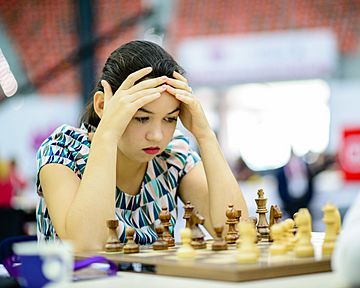Aleksandra Goryachkina facts for kids
Quick facts for kids Aleksandra Goryachkina |
|
|---|---|
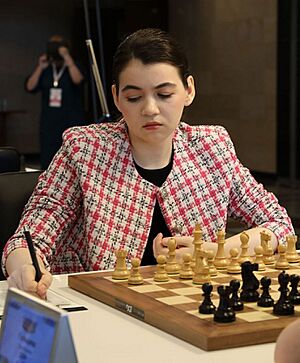
Goryachkina at the Russian Chess Championship Superfinal 2024
|
|
| Full name | Aleksandra Yuryevna Goryachkina |
| Country | Russia |
| Born | 28 September 1998 Orsk, Russia |
| Title | Grandmaster (2018) |
| FIDE rating | 2582 (February 2026) |
| Peak rating | 2611 (August 2021) |
Aleksandra Goryachkina (born September 28, 1998) is a talented Russian chess player. She holds the highest title in chess, Grandmaster (GM). She is currently ranked as one of the top women chess players in the world. She also holds the record as the highest-rated Russian woman in chess history.
In 2020, Goryachkina challenged for the Women's World Championship title. She played against Ju Wenjun but lost in a fast-paced tie-break round. Aleksandra has won the Russian Women's Chess Championship three times: in 2015, 2017, and 2020. In August 2023, she won the Women's Chess World Cup by beating Nurgyul Salimova.
Aleksandra grew up in a chess-loving family. Her father is a chess coach, and both her parents are strong players. She quickly became a chess prodigy, winning many youth world championships. She won titles in the under-10, under-14, and under-18 age groups. She also won the World Junior Championship twice. At just 13 years old, Goryachkina became one of the youngest Woman Grandmasters (WGM) ever. By early 2018, she became one of the youngest women to earn the Grandmaster title. Later that year, she joined the top 10 women players in the world. She then reached the top 3 after winning the 2019 Candidates Tournament. This win allowed her to play for the World Championship title in 2020.
Contents
Early life and family
Aleksandra Goryachkina was born on September 28, 1998, in Orsk, Russia. Her parents, Larisa Matvienko and Yuri Goryachkin, are both skilled chess players. Her father is a FIDE Master (FM) and a chess coach. Her mother is also a strong player. Aleksandra has a younger sister, Oksana, who also plays chess.
Even though her parents played chess, Aleksandra was not interested at first. She preferred dancing and table tennis. But she eventually became interested in chess and started playing at age six. Her father would bring her to his evening chess classes. Aleksandra mostly taught herself by watching her father's lessons. Her father became her first coach. She was able to beat her mother in chess by age nine, and her father soon after.
In 2011, after winning her first youth world championship, Aleksandra and her father moved to Salekhard. This move allowed her to train at the Anatoly Karpov Polar Chess School. Her father also worked there as a coach. After about a year, her mother and younger sister joined them. At the Polar Chess School, she started working with Vladimir Belov, a Russian Grandmaster.
Chess career highlights
Becoming a World Junior Champion (2008–2014)
Goryachkina had great success in youth chess tournaments from a young age. She won five gold medals in girls' championships. These included the World Youth under-10 (2008), under-14 (2011), and under-18 (2012) events. She also won two World Junior titles for players under 20, in 2013 and 2014. She was only 14 and 16 years old when she won these junior titles.
Her best performance was in the 2011 under-14 event, where she won all nine of her games. She also won gold medals at the European Youth Chess Championship in 2010 (under-12), 2011 (under-14), and 2012 (under-18).
Goryachkina reached a chess rating of 2000 at age ten in 2009. In 2011, at age twelve, her rating jumped by almost 300 points. She earned the Woman International Master (WIM) title and a Woman Grandmaster (WGM) "norm" (a high-level performance needed for a title). By March 2012, at 13 years old, she became one of the youngest WGMs in history.
She continued to improve her rating, reaching 2400 by January 2013. She played in the Tata Steel C Tournament in 2013, a major international event. She also played in the Russian Women's Championship Superfinal for the first time. She finished joint fourth in 2013 and joint third in 2014. During 2014, she even defeated two Grandmasters who were rated above 2600.
Becoming a Grandmaster (2015–2018)
Goryachkina reached a rating of 2500 in January 2016, at age 17. She made her debut in the Women's World Chess Championship in 2015. She was eliminated in the second round. Later that year, she became the Russian Women's Champion for the first time. She won the Superfinal with a strong score of 8 out of 11 games. This performance also earned her first Grandmaster "norm."
In 2017, Goryachkina continued to improve. She won a silver medal at the European Individual Women's Championship. At the end of the year, she won her second Russian Women's Championship. She won a fast-paced playoff game against Natalia Pogonina.
In April 2018, she earned her third and final Grandmaster norm at the Aeroflot Open. This made her the fifth-youngest woman to earn the Grandmaster title, at 19 years and 5 months old. Her rating increased to 2535 in August 2018, and she entered the women's top 10 for the first time.
Challenging for the World Championship (2019–present)
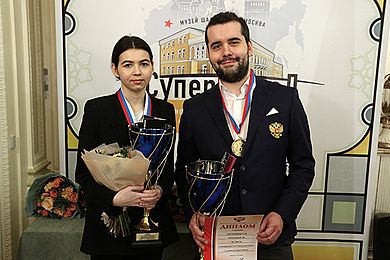
In 2019, Goryachkina had a major breakthrough at the Women's Candidates Tournament. This tournament decided who would challenge for the World Championship. Goryachkina won the tournament by a large margin, finishing 1½ points ahead of the second-place player. Her strong performance moved her up to No. 3 in the world rankings. This win earned her the right to challenge the reigning Women's World Chess Champion, Ju Wenjun.
The World Championship match took place in January 2020. The first half was in China, and the second half was in Russia. The match was very close, with both players winning games. Goryachkina took the lead at one point, but Ju Wenjun fought back. The match ended in a tie after 12 regular games, so they played four rapid (fast) tie-break games. Ju Wenjun won the tie-breaks and kept her title.
| Rating | Classical games | Rapid tiebreaks | Points | |||||||||||||||
|---|---|---|---|---|---|---|---|---|---|---|---|---|---|---|---|---|---|---|
| 1 | 2 | 3 | 4 | 5 | 6 | 7 | 8 | 9 | 10 | 11 | 12 | R1 | R2 | R3 | R4 | |||
| 2584 | ½ | ½ | ½ | 1 | 0 | ½ | ½ | 0 | 1 | 1 | ½ | 0 | ½ | ½ | 1 | ½ | 6 (2½) | |
| 2578 | ½ | ½ | ½ | 0 | 1 | ½ | ½ | 1 | 0 | 0 | ½ | 1 | ½ | ½ | 0 | ½ | 6 (1½) | |
Goryachkina also performed very well in the 2019–21 FIDE Women's Grand Prix series. She finished joint first in two events and joint second in another. She won the overall Grand Prix series. In October 2020, she reached her highest rating at the time, 2582. She then won her third Russian Women's Championship Superfinal. She defeated Polina Shuvalova in a special tie-break game called "armageddon."
In August 2021, Goryachkina reached a new personal highest rating of 2611. This made her the fourth-highest rated female player in chess history. She also played in the 2023 Women's Candidates Tournament. She won her first match but lost in the semifinals. In August 2023, Goryachkina won the Women's Chess World Cup by beating Nurgyul Salimova in the finals. In the 2024 Candidates, she finished in fifth place.
Team competitions
Youth team events
Goryachkina first found success in youth team events in 2012. She led Russia to a gold medal at the under-18 girls' European Team Championship. She played on the top board and won all three of her games. In 2014, she played on the second board for Russia at the under-16 Chess Olympiad. Russia won a silver medal. Goryachkina also won an individual gold medal for girls. She even won a special "brilliancy award" for a game where she bravely sacrificed a rook and a knight.
International team events
Goryachkina has played for Russia's national women's team in major international events. These include the European Team Championship, the World Team Championship, and the Chess Olympiad. She first joined the national team in 2013, helping Russia win a silver medal at the European Team Championship.
In 2015, she won a silver medal at the Women's World Team Championship. Russia also won the team silver medal. Later that year, she won both individual and team gold medals at the Women's European Team Championship.
Goryachkina played in her first Chess Olympiad in 2016. In 2017, she won her first team gold medal at the World Team Championship. Russia also won another gold medal at the European Team Championship that year.
In the 2018 Chess Olympiad, Goryachkina won a bronze medal on the second board. In 2019, Russia won the silver medal at the World Team Championship. Russia then won their third European Team Championship in a row. Goryachkina played on the top board for Russia for the first time in this event.
Historical achievements
Aleksandra Goryachkina is the fourth-highest rated woman in chess history. She reached a peak rating of 2611 in August 2021. Only Judit Polgár, Hou Yifan, and Koneru Humpy have had higher ratings. She is also the highest-rated Russian woman in chess history.
Playing style
Goryachkina often starts her games with the white pieces by playing 1.d4, which is called the Queen's Pawn Game. Her favorite openings with 1.d4 are the Queen's Gambit Declined and the Catalan. When she plays with the black pieces against 1.d4, she often uses the Slav. Against 1.e4, she commonly plays the Caro-Kann.
Personal life
Outside of playing in tournaments, Goryachkina enjoys teaching chess. She helps at her father's chess school in Salekhard. She also gives special chess classes. In the past, she taught chess online. Now, she mostly teaches in person, but she still uses online platforms to practice her English. Goryachkina is also interested in cosmetology and classical music.
Notable games
| This section uses algebraic notation to describe chess moves. |
- Cemil Can Ali Marandi (2423) – Aleksandra Goryachkina (2441), 2014 World Youth Chess Olympiad (under-16): Round 7; Slav defence, 0–1. This game won a "brilliancy prize" because of Black's brave and exciting play.
-
- 1. d4 d5 2. c4 c6 3. Nf3 Nf6 4. e3 Bf5 5. Nc3 e6 6. Nh4 Be4 7. f3 Bg6 8. Qb3 Qc7 9. Bd2 Be7 10. Nxg6 hxg6 11. g3 a6 12. Rc1 dxc4 13. Bxc4 c5 14. dxc5 Nc6 15. Qc2 Rd8 16. Be2 Rxh2 17. Rxh2 Qxg3+ 18. Rf2 Ng4 19. fxg4 Bh4 ("Black has a dangerous attack, but has given up a rook and a knight for it.") 20. Kd1? ("White makes a mistake here.") Qxf2 21. Qe4 Qe1+! ("White probably missed this move.") 22.Kc2 Qxd2+ 23.Kb1 Bg5 ("Black has won back all the pieces she sacrificed and has a winning position.") 24.Bxa6 Qxe3 25.Qxe3 Bxe3 26.Bxb7 Na5 27.Ba6 Bxc1 28.Kxc1 Rd4 29.Be2 Kd7 30.Kc2 Nb7 31.Bb5+ Kd8 32.Na4 Rxg4 33.Kc3 f5 34.b4 f4 35.Kd3 g5 36.Ba6 Kc7 37.Nc3 Rg3+ 38.Kd4 e5+ 39.Kc4 f3 40.Nd5+ Kd7 41.Kb5 Nd8 42.Kb6 f2 43.Bb5+ Ke6 44.c6 Nxc6 45.Kxc6 e4 46.Bc4 Ke5 47.b5 Rg1 48.b6 Rc1 49.b7 Rxc4+ 50.Kd7 f1Q 51.b8Q+ Kd4 52.Ne7 Qh3+ 53.Kd6 Qh2+ 0–1
See also
 In Spanish: Aleksandra Goryachkina para niños
In Spanish: Aleksandra Goryachkina para niños
 | Victor J. Glover |
 | Yvonne Cagle |
 | Jeanette Epps |
 | Bernard A. Harris Jr. |


